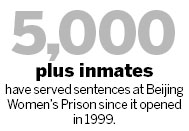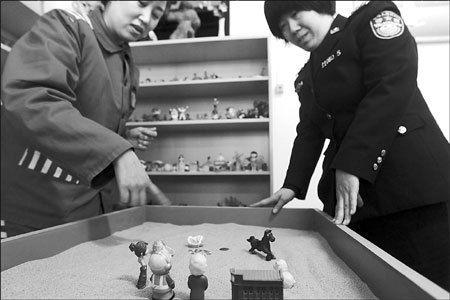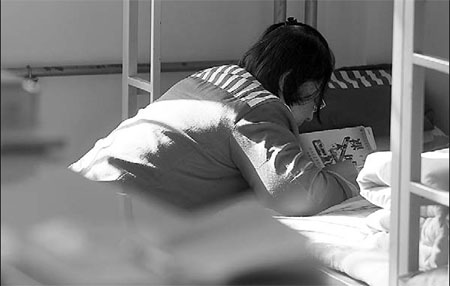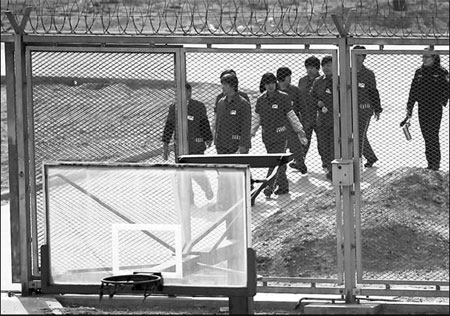A sense of the ordinary from behind bars
Updated: 2013-03-19 07:41
By Cao Yin (China Daily)
|
||||||||
|
An inmate enjoys a light moment with a corrections officer over a sandbox in Beijing Women's Prison on March 5. Photos by Cui Meng / China Daily |
|
An inmate works on her reading material in Beijing Women's Prison on March 5. |
|
A group of inmates on the way to their cells after work in Beijing Women's Prison on March 5. |

Beijing Women's Prison offers its inmates shopping, counseling
Zhang Liying's finger traced the list of products on the screen in front of her - snacks, orange juice, makeup, toothpaste, shampoo, soap.
"Just three steps and I can find whatever I want to buy," she said as she scrolled through the items on the website, like a housewife browsing for online bargains.
But Zhang isn't a housewife. She is an inmate at Beijing Women's Prison.
The touch-screen display is connected to an intranet, not the Web, and is used by inmates to buy daily necessities and the occasional treat.
"It's very easy," said Zhang, a short, thin woman, wearing a blue uniform with white stripes on the shoulders. "And there is a lot of choice."
Inmates can spend up to 300 yuan ($48) on products once a month - the amount is higher for the elderly or infirm. Purchases are made with money the women earn through prison work or good behavior.
The system works like Taobao, China's popular online marketplace, but the products come from the commissary instead of various vendors.
"When new inmates arrive, they receive three months of orientation, including training in how to operate the technology," said Li Xiaona, the correction officer in charge of Zhang's cellblock. "Younger and older women seem to like it.
"After all," she said, "women in prison also need to enjoy the feeling of shopping. It's in a woman's nature".
Staying connected
Beijing Women's Prison, located in southern Daxing district, opened in 1999 and houses about 1,000 inmates.
According to a previous statement by city authorities, most of the women who end up here have committed violent or economic crimes, or were involved in drug trafficking.
The facility was chosen to pilot the high-tech intranet in September, and Gan Yonghong, head of inmate management, said it has quickly become an integral part of the prison's reward and punishment system.
"The spending cap on purchases depends on an inmate's performance," she explained. "If an inmate does well and gets her sentence reduced, her account will be credited.
"We don't pay as much (for work) as the outside world. After all, it's a prison. It's just a token payment," Gan said.
The intranet is not just for shopping. Women can browse in-house media to keep up with current affairs, and comments can be shared on an internal micro blog, not too different from Twitter or Sina Weibo.
Seven inmates run the "media center", which includes a website, a newspaper and a television channel, from an office on the second floor of the main building.
"What I do is collect information from newspapers or magazines provided by the correction officers and then write stories for our (intranet) news site," Shen Xiaoxia, one of the seven, said, sitting at her keyboard.
The 38-year-old former civil servant is a month away from completing her first year of a six-year stretch for taking bribes. She said she enjoys her prison job, as her postgraduate major at college was computer science.
"We focus on hot social issues, such as the country's two sessions," she said. "I'm paid about 100 yuan a month."
Help at hand
But technology is not always the answer. Sometimes inmates still need human interaction. Psychological counseling is offered in a room known as the Cocoon Bar.
He Miao, 33, who is serving life for murder, said the space, which has scenic photos on the walls, pictures of flowers on the floor and no iron bars on the door, is a "haven" when she feels troubled.
Wang Ying, 33, also said she often visits the "bar" when she feels down. She has a 7-year-old son, but her husband divorced her when she was sent to prison.
Choking back tears, she said: "My ex broke up with me when I came here in 2008. We'd known each other since childhood.
"I guessed he might do it, but I never thought it would be so fast," she said with a sigh, as she adjusted her pink glasses to hide her tears.
Wang is serving 15 years for fraud and said the initial pain was deciding if she should tell her son where she really is. "The sentence is long, not only for me, but also for my child."
She sought solace from correction officers at the Cocoon Bar. "I just like sitting there, listening to some light music and talking with the officers," she said.
Senior officer Li said her cellblock has 65 inmates, more than a third of whom are divorced .
"It's hard for us to mediate," she said. "What we can do is provide inmates legal guidance on property distribution and child custody for female inmates, to help protect their rights."
For Liu Yan, a lifer who embezzled 71 million yuan of public funds in 1999, the biggest heartache is the thought she will probably never have children.
"When I was sentenced, I was 30. Now I'm 44. Maybe it's too late for me now," she said. "I've tried to reduce my sentence through good behavior, but I fear such a long sentence has destroyed my dream to be a mother."
China has no policy on whether female prisoners should be provided a chance to have a child, and both inmates and correction officers said authorities need to look at the problem, and soon.
"I still want to have a child when I'm released," said Liu, who will be released on parole in September after punishement mitigation. "After all, I'm a woman."
All inmates except He Miao spoke on condition of using an alias.
caoyin@chinadaily.com.cn
(China Daily 03/19/2013 page4)

 In Photos: 7.0-magnitude quake hits Sichuan
In Photos: 7.0-magnitude quake hits Sichuan
 Li Na on Time cover, makes influential 100 list
Li Na on Time cover, makes influential 100 list
 FBI releases photos of 2 Boston bombings suspects
FBI releases photos of 2 Boston bombings suspects
 World's wackiest hairstyles
World's wackiest hairstyles
 Sandstorms strike Northwest China
Sandstorms strike Northwest China
 Never-seen photos of Madonna on display
Never-seen photos of Madonna on display
 H7N9 outbreak linked to waterfowl migration
H7N9 outbreak linked to waterfowl migration
 Dozens feared dead in Texas plant blast
Dozens feared dead in Texas plant blast
Most Viewed
Editor's Picks

|

|

|

|

|

|
Today's Top News
Live report: 7.0-magnitude quake hits Sichuan, heavy casualties feared
Boston suspect cornered on boat
Cross-talk artist helps to spread the word
'Green' awareness levels drop in Beijing
Palace Museum spruces up
First couple on Time's list of most influential
H7N9 flu transmission studied
Trading channels 'need to broaden'
US Weekly

|

|










